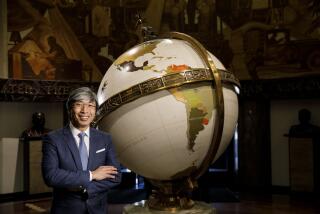Richard Eder dies at 82; won a Pulitzer as L.A. Times book reviewer
Richard Eder, a foreign correspondent who made the unusual transition to arts critic and was awarded a 1987 Pulitzer Prize for his Los Angeles Times book reviews, died Friday at Tufts Medical Center in Boston. He was 82.
The cause was pneumonia, a complication of post-polio syndrome, said his daughter Maria Eder Miller.
------------
FOR THE RECORD:
Richard Eder: In the obituary of book critic Richard Eder that appeared in the Nov. 23 California section, one of his surviving sisters was listed as Liz McCullough. Her name is Elizabeth McCulloch. —
------------
Richard Eder joined the New York Times as a copy boy in 1954 and rose through the ranks, reaching his goal of becoming a foreign correspondent in the early 1960s. He covered wars in Latin America and Europe and interviewed leaders such as Fidel Castro. But after about a dozen years of this type of reporting, Eder, who studied history and English at Harvard, was ready for a change.
“I had always been interested in the arts, and I also found eventually that being a foreign correspondent wore out,” he said in a 1988 interview with Contemporary Authors.
Eder became a film critic at the New York Times, then was chief drama critic at the paper from 1977 to 1979. “My two years as a theater critic were enormously exciting,” he said.
But they were also turbulent, with several Broadway producers complaining that his reviews were too tough. He did have his defenders, including off-Broadway producer Joseph Papp, who said in a letter to the paper — published in the Columbia Journal of American Studies — that Eder came to the job with “no obligations to stars, directors or even to the avant-garde. He doesn’t suck up, and I admire that.”
But Eder was out as critic and back to foreign reporting. “It hurt to be told to stop writing about theater,” he said.
He made the leap to the Los Angeles Times as book critic in 1982. He chose to review mostly fiction, and he sought to put himself in the place of the reader.
“I mean to convey a sense of what it’s going to be like to read the book,” he told Contemporary Authors. He might impart some “fairly severe criticism,” but he also aimed “to present enough of what the book is like so that a reader may in fact come to a different conclusion and say, ‘He didn’t like it, but it sounds interesting.’”
Though his reviews could still be tough, Eder found a far more sympathetic reaction in the book world. In 1987, he won not only the Pulitzer Prize for criticism, but also the National Book Critics Circle’s citation for excellence in reviewing.
The awards were for his work in 1986, which included about 100 reviews. One of the pans he delivered that year was of Pat Conroy’s novel “The Prince of Tides.”
“Inside this fat book, a thin book is struggling to get out,” Eder wrote. “It never does, but from time to time, we glimpse an elegant ankle, a sinewy wrist and the flash of eyes alive with wit and compassion.”
He was much more complimentary toward Laurie Colwin’s “Another Marvelous Thing,” saying that it “skitters, leaps and dodges over a variety of literary sinkholes, and accumulates excitement for never once falling in.”
And of Primo Levi’s “The Monkey’s Wrench,” he wrote: “We are moved, almost unaccountably. Levi’s art works without our quite knowing how.”
Eder also valued the chance to bring attention to nonfiction he admired, including “Shattering the German Night,” about the nearly forgotten White Rose resistance movement against Nazism.
“The joy of reviewing,” he told Contemporary Authors, “is discovering.”
Richard Gray Eder was born Aug. 16, 1932, in Washington, D.C. He was raised in part in Argentina, where his father was an executive with International Telephone and Telegraph. Eder contracted polio at a summer camp there, resulting in a lifelong limp.
He graduated from Phillips Academy boarding school in Andover, Mass., before enrolling at Harvard, where he earned a bachelor’s degree in 1954.
Eder, who lived in the Boston area, retired from the L.A. Times in 1999.
In addition to Maria, who lives in New York, he is survived by his wife, Esther; daughters Ann Eder Mulhane and Claire Eder of Boston; sons Ben Garcia of San Diego, Michael Eder of Boston, Luke Eder of Portland, Maine, and Jamie Eder of Oakland; sisters Liz McCullough of Gainesville, Fla., and Luli Gray of Chapel Hill, N.C.; eight grandchildren; and two great-grandchildren.
Twitter: @davidcolker
More to Read
Start your day right
Sign up for Essential California for the L.A. Times biggest news, features and recommendations in your inbox six days a week.
You may occasionally receive promotional content from the Los Angeles Times.







